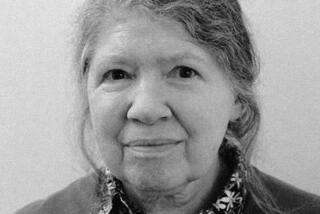Book Review : Couple Make a Go of Marital Mismatch in Saga for the ‘80s
- Share via
His Third Her Second by Paul Estaver (Soho: $17.95; 260 pages)
“His Third Her Second” is ideal vacation reading for the ‘80s and beyond. Instead of thrusting you into a violent, bewildering and terrifying world, it transports you to the magic realm of Henry Calef and his wife Margo, who are attempting, against considerable odds, to create a happily united family from six disparate and occasionally hostile elements. The author of this charming story may find himself in the vanguard of a whole new movement. Now that daily life provides all the horror and confusion that anyone can endure, escapist reading must offer a respite.
Imagine a twice-divorced 50 year old man meeting a widow with three young children at a service station; not only falling in love on the spot and proposing marriage right after lunch, but declaring himself eager to share the responsibility of their blended families. Henry has a 7-year-old adopted daughter Libby, left in his custody when his last wife decamped after deciding she liked the idea of motherhood more than the actuality. He’s gentle, witty and stable as Mt. Rushmore; optimistic despite his marital history; willing to adapt to Margo’s necessarily rather haphazard life style. Completing the dream, Margo is cheerful, resourceful, and beautiful in a wholesome outdoorsy way. Henry is an upper-echelon Washington bureaucrat; Margo is 20 years younger, a free spirit who runs a riding school and supplements her uncertain income by tending bar. Instead of causing a conflict, these significant differences merely intensify the mutual attraction. We’re close to a new definition of fantasy here.
An Arresting Metaphor
The difficulties that form the plot are caused by the assorted children, none of whom have yet learned adaptive techniques, and who get along, in one of Henry’s most arresting metaphors, “like 4 pairs of sneakers in a dryer.”
A fiercely willful child, Henry’s daughter Libby is sweetly manageable when she gets her way and an absolute tyrant when she doesn’t. Himself the victim of a rigid upbringing, Henry has learned to give in on the trivial issues and stand firm on the crucial ones. Though he’s rewarded with Libby’s unqualified adoration, he sometimes feels “like a marsupial.” Until Margo, all the women he’s met have either gushed over Libby or regarded her as a temporary disability, attitudes that have effectively prevented him from forming any lasting relationships.
Margo’s easy and natural approach strikes precisely the right note, instantly winning Libby’s approval. Her three children are another case entirely. Her eldest son Marty treats Henry with the faintly contemptuous, exaggerated respect a conscript might show to a sergeant. Marty, in fact, has actually attempted to rob a bank sometime before the story even begins. After an unsuccessful attempt to intimidate Henry by cataloguing her family’s worst traits, Sandra, the 13-year-old, finds increasingly subtle ways to keep him perpetually off-balance. Tommy, Margo’s youngest son, quickly forms an unholy alliance with Henry’s Libby, united in resistance to their well-meaning parents.
Years pass, marked by familiar familial crises refreshed by Henry’s wry perspective on disaster and Margo’s remarkable resilience. After suffering his second coronary attack, Henry inventories his life to a fascinated doctor. “I’ve married a woman with three teen-agers who have demolished two automobiles, a third of my record collection and the microwave . . . I have tripled my sexual activity and joined a quaint religious sect.” “Which one?” the cardiologist asks, expecting a clue from the answer. “The Episcopalians,” Henry says, his aplomb unaffected even by the specter of open-heart surgery.
How and Why It Endures
Though a cynic observing this marriage would have given it six months, the author shows exactly how and why it endures for decades. By the end of the novel, Henry and Margo are grandparents, aware that one child is almost certainly gay while another is about to move into the basement apartment with her three toddlers. The school drop-out has become the most successful of the lot, leaving her conventional siblings at the starting gate. Tommy’s future is still undecided, and likely to remain so for the foreseeable future. Having weathered all this stress plus an extramarital affair, the hero and heroine are still blissfully happy and ready for new challenges. How’s that for a 20th-Century fantasy of modern life?
More to Read
Sign up for our Book Club newsletter
Get the latest news, events and more from the Los Angeles Times Book Club, and help us get L.A. reading and talking.
You may occasionally receive promotional content from the Los Angeles Times.








